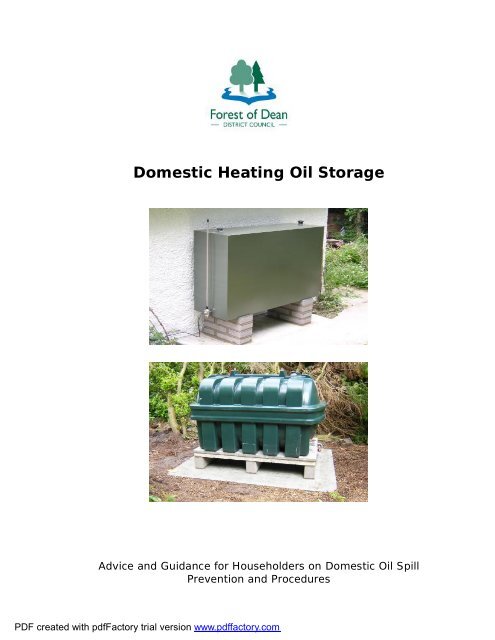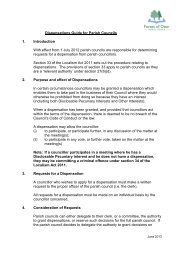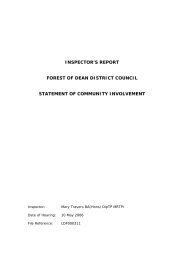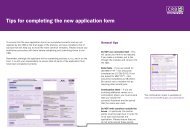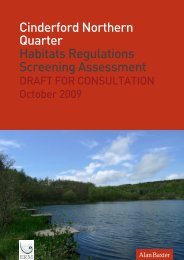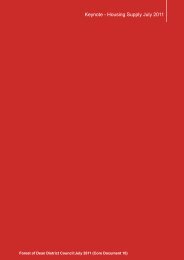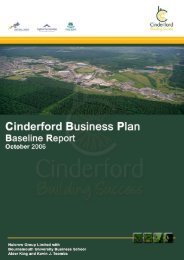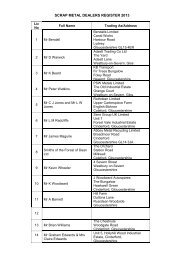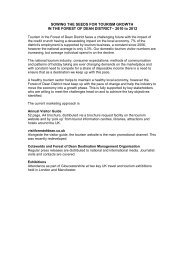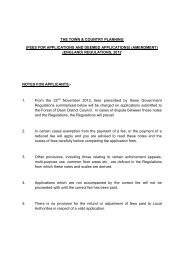Domestic Heating Oil Storage Guidance - Forest of Dean District ...
Domestic Heating Oil Storage Guidance - Forest of Dean District ...
Domestic Heating Oil Storage Guidance - Forest of Dean District ...
Create successful ePaper yourself
Turn your PDF publications into a flip-book with our unique Google optimized e-Paper software.
<strong>Domestic</strong> <strong>Heating</strong> <strong>Oil</strong> <strong>Storage</strong><br />
Advice and <strong>Guidance</strong> for Householders on <strong>Domestic</strong> <strong>Oil</strong> Spill<br />
Prevention and Procedures<br />
PDF created with pdfFactory trial version www.pdffactory.com
INTRODUCTION:<br />
Although guidance is available from the Environment Agency relating to storage <strong>of</strong><br />
heating oil, it is largely aimed at commercial premises. The intention <strong>of</strong> this document<br />
is to provide user-friendly information to householders who rely on heating oil. While<br />
domestic oil storage tanks and associated pipework may seem relatively innocuous, if<br />
they are poorly installed, inadequately maintained or faulty they can create a<br />
significant pollution incident. Leaked heating oil can be very difficult and extremely<br />
expensive to clean up. In more serious incidents, homes have had to be evacuated as<br />
oil has soaked into the ground beneath the tank, migrated under the house and<br />
produced fumes inside which render residence intolerable. This document is intended<br />
to provide advice relating to oil storage tanks and the results <strong>of</strong> leaks but, more<br />
importantly, to give practical advice on how to ensure that leaks do not occur. A little<br />
time and money spent on maintenance now could avoid future clean-up costs running<br />
to thousands <strong>of</strong> pounds.<br />
WHAT CAN HAPPEN<br />
The following are examples <strong>of</strong> real incidents that illustrate what can happen:-<br />
• The underground oil supply pipe between a tank and the house developed a leak<br />
which contaminated the ground beneath a neighbouring house. That house had to be<br />
evacuated because <strong>of</strong> the resultant odour and fumes inside. The ground floor had to<br />
be completely removed to clean up the contamination, the overall cost <strong>of</strong> which was<br />
several thousand pounds.<br />
• A tank mounted on concrete block supports corroded and oil soaked into the ground<br />
beneath. Water pipes serving two houses ran under the spill area and oil was able to<br />
penetrate the plastic pipes and contaminate the water supply. The contaminated soil<br />
had to be removed and the water pipes replaced at a cost <strong>of</strong> several thousand<br />
pounds.<br />
• A tank was vandalised, resulting in significant oil spillage. The very costly clean-up<br />
operation required a soil treatment operation that lasted several months. Restriction<br />
<strong>of</strong> access to the tank and/or bunding could have avoided the problem.<br />
POTENTIAL HEALTH RISKS:<br />
<strong>Heating</strong> oil fumes are very strong smelling and can be detected by people at very low<br />
concentrations. However, people exposed to the smell can <strong>of</strong>ten get used to the smell<br />
relatively quickly, so the opinion <strong>of</strong> someone independent can <strong>of</strong>ten be useful in<br />
detecting a leak. A leak <strong>of</strong> heating oil in or near your house can cause the following<br />
problems:-<br />
• feeling “drunk” e.g. sleepy, nauseous, fuzzy-headed, slow to react, dizzy, etc;<br />
PDF created with pdfFactory trial version www.pdffactory.com
• headaches, sore throats, etc;<br />
• skin rashes;<br />
• heating oil can penetrate plastic water supply pipes, contaminating the water and<br />
giving rise to odours and taints. This can pose a serious risk to health if consumed;<br />
• sub-surface utilities and house footings could also be at risk; and<br />
• heating oil is toxic and harmful to plants and animals.<br />
WON’T MY INSURANCE COVER ME<br />
Cleaning up oil spills is difficult, time-consuming and expensive and will cause you and<br />
any affected neighbours considerable inconvenience. Not all household insurance<br />
policies cover this type <strong>of</strong> incident and so you should ensure that your own policy<br />
includes cover for the following:-<br />
• the cost <strong>of</strong> replacing the lost oil;<br />
• the cost <strong>of</strong> cleaning up oil on your own property; and<br />
• a high enough liability limit to cover clean-up costs if neighbouring land, properties<br />
or waters are affected;<br />
It is against the law to cause pollution and the responsibility for cleaning up lies with<br />
the tank owner. You must also be aware that an insurance company may not pay up if<br />
a leak has been occurring over an extended time period. This makes it imperative that<br />
you maintain and monitor your system on a regular basis in order to be able to<br />
present a robust case to your insurance company. A specimen Tank Details Log Sheet<br />
is attached as Appendix A to assist in this process.<br />
PREVENTION OF LEAKS AND SPILLS:<br />
The best way to avoid risks to health and the environment as well as property<br />
damage, inconvenience and expense is to take effective preventative actions as<br />
summarised below:-<br />
• Ensure that tanks are located in a suitable position. They should be located as far<br />
away as possible from any ponds, boreholes, springs, streams and drains;<br />
• New or replacement tanks should be installed by OFTEC registered technicians;<br />
PDF created with pdfFactory trial version www.pdffactory.com
• If your tank meets any <strong>of</strong> the following criteria, it should be bunded:-capacity<br />
greater than 2500 litres; sited within 10 metres <strong>of</strong> a stream, ditch, river, lake, pond or<br />
canal; sited where any spillage could run into an open drain or loose-fitting manhole<br />
cover; sited within 50 metres <strong>of</strong> a source <strong>of</strong> drinking water, e.g. spring, well,<br />
borehole; sited where the tank vent pipe outlet cannot be seen from the fill point.<br />
• Even where the tank does not meet the above criteria, it is advisable to provide<br />
bunding to all tanks. A bund is an impermeable collection trough which sits<br />
underneath the tank and, in the event <strong>of</strong> a leak, will collect and retain the oil. To this<br />
end, the bund should have the capacity to hold at least 10% more than the capacity<br />
<strong>of</strong> the tank itself -the 10% buffer allowing for collection <strong>of</strong> rainwater over time. Please<br />
be aware that some tank designs (usually referred to as “integrally bunded”) actually<br />
incorporate a bund for secondary containment, rendering a “trough” unnecessary.<br />
However, this is not the same as a “double-skinned” or “twin-walled” tank which<br />
provides extra protection via a double skin but does not provide for containment <strong>of</strong><br />
spillages.<br />
• Check the physical condition <strong>of</strong> your tank and pipework regularly, looking for<br />
bulging, damage and interference. Pay particular attention to corners, pipework joints,<br />
welds and the points where the tank is supported. Additionally, be on the lookout for<br />
staining <strong>of</strong> tank supports or bases and for oily smells. If it is a metal tank, ensure that<br />
it is painted regularly to prevent corrosion.<br />
• Get your tank and pipework (as well as your boiler) serviced at least once per year<br />
by an OFTEC registered technician;<br />
• Monitor your usage <strong>of</strong> oil. If consumption appears to increase, check the system for<br />
leaks immediately.<br />
• Make sure your tank is not overfilled – carefully check the level <strong>of</strong> oil before ordering<br />
a delivery and be at home when the tank is filled so that you can stop the delivery if<br />
there are any leaks or overflows;<br />
• Keep fill points on the tank clear <strong>of</strong> obstructions and ensure that they are tamperpro<strong>of</strong>;<br />
• Ensure that you know where pipes are routed under the ground so that you can<br />
prevent damage to them, e.g. digging in garden areas, tent pegs, etc; and • Never<br />
leave sight gauge valves open.<br />
WHAT SHOULD I DO IF I FIND A LEAK<br />
If you discover or suspect a leak it is absolutely vital that you act immediately to<br />
minimise its impact. You should:-<br />
PDF created with pdfFactory trial version www.pdffactory.com
• Try and find out where the leak is coming from and stop any further oil leaking as<br />
soon as is possible. Contact your fuel supplier to arrange removal <strong>of</strong> any remaining<br />
fuel that would be likely to leak;<br />
• Prevent any spilled oil from entering watercourses or drains using an absorbent<br />
material, e.g. sand or purpose-designed spillage absorbents. If you suspect that a<br />
watercourse has been, or is likely to be, polluted contact the Environment Agency’s<br />
24-hour Pollution Hotline on (0800) 807060;<br />
• Arrange for an engineer or competent person to repair or replace the tank and/or<br />
pipework as necessary;<br />
• Contact your insurance company to advise them <strong>of</strong> the leak and to set in motion a<br />
potential claim. The company may appoint a loss adjuster to co-ordinate its response;<br />
and;<br />
• Report any taste or smell <strong>of</strong> oil in your drinking water immediately to your water<br />
company. Do not drink any water suspected to be contaminated until it has been<br />
tested and cleared. If you have a private water supply, contact <strong>Forest</strong> <strong>of</strong> <strong>Dean</strong> <strong>District</strong><br />
Councils Food and Safety team on (01594) 812411.<br />
• If there is a strong smell <strong>of</strong> oil in your home, immediately open doors and windows<br />
to provide additional ventilation.<br />
• For further advice in all eventualities, contact <strong>Forest</strong> <strong>of</strong> <strong>Dean</strong> Councils Environmental<br />
Protection team on (01594) 812408.<br />
YOU SHOULD NEVER:-<br />
• delay taking the necessary actions;<br />
• use detergents or try to wash the spill away with a hose -these actions will make the<br />
situation worse; or<br />
• assume that the problem will go away or solve itself.<br />
FURTHER INFORMATION:<br />
• Environment Agency Website: http://www.environment-agency.gov.uk/ Search for<br />
“domestic oil storage”.<br />
• “Get to Know Your <strong>Oil</strong> Tank -A Guide to Looking After an <strong>Oil</strong> Storeage Tank and<br />
Avoiding Pollution” available at;<br />
http://www.<strong>of</strong>tec.org/documents/Gettoknowyouroiltank.pdf<br />
PDF created with pdfFactory trial version www.pdffactory.com
APPENDIX A<br />
HEATING OIL STORAGE TANK DETAILS<br />
It is recommended that you check your tank and fill in the details below so that they<br />
are to hand should you need them.<br />
Manufacturer:<br />
________________________________<br />
Model:<br />
________________________________<br />
Reference/Serial Number: ________________________________<br />
Capacity:<br />
___________________________ litres<br />
Construction:<br />
plastic <br />
steel<br />
<br />
Spillage Protection: single skin <br />
integral bund <br />
double skin <br />
external bund <br />
Installation Engineer: ________________________________<br />
Contact No:<br />
________________________________<br />
<strong>Oil</strong> Supply Company:<br />
________________________________<br />
Contact No:<br />
________________________________<br />
Insurance Company:<br />
________________________________<br />
Policy No:<br />
______________________________<br />
Contact No:<br />
______________________________<br />
PDF created with pdfFactory trial version www.pdffactory.com
Annual Tank Checks:<br />
Date <strong>of</strong><br />
Inspection<br />
Inspection<br />
Engineer Signature<br />
Resultant Actions<br />
PDF created with pdfFactory trial version www.pdffactory.com


